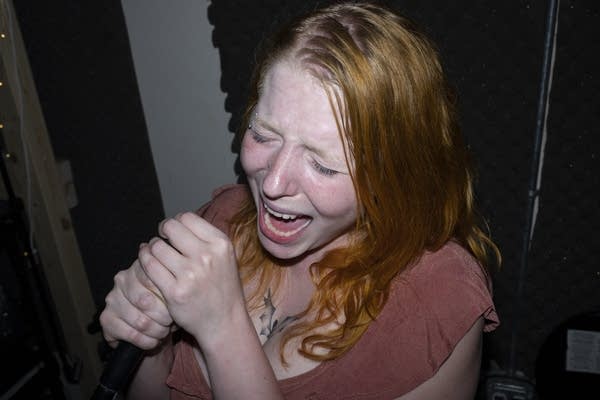After a year of mutual aid, Gully Boys return to the stage for Pride
Community needs remain a priority for the band. And now they can perform again, too.

Go Deeper.
Create an account or log in to save stories.
Like this?
Thanks for liking this story! We have added it to a list of your favorite stories.
Nadirah McGill remembers their family practicing mutual aid for as long as they can remember. This concept of community taking care of community isn’t new to them.
“I think it’s really rooted in Black culture,” they said.
So when Minneapolis was in the throes of the pandemic combined with the uprising following George Floyd’s murder, they sprung into action.
McGill and their band the Gully Boys, where McGill drums and sings, had been on an absolute high, gaining traction, fans and a schedule packed with gigs. Instead of retreating when COVID-19 hit, the trio pivoted to using their platform as a beloved local band to focus on mutual aid.
Turn Up Your Support
MPR News helps you turn down the noise and build shared understanding. Turn up your support for this public resource and keep trusted journalism accessible to all.

What McGill didn’t expect was the extent of their reach. People were looking for ways to help others financially and turned to others like McGill who were on the ground distributing supplies and funds to those displaced, struggling with money or in need of basics like food and household products. McGill was also in school for music business. They had just taken an Excel class, which helped them stay organized.
The band also raised $20,000 for the Northside Funders Group to rebuild north Minneapolis after civil unrest in 2020. And McGill and their bandmates, Kathy Callahan and Natalie Klemond, got together weekly throughout the summer to make meals for residents facing housing insecurity, living in outdoor encampments in Powderhorn, Beltrami and Logan parks.
“We wanted to focus on our community that had nurtured us so much,” McGill, who lives in south Minneapolis, said. “We saw so many of our friends and family being totally left behind by the government – especially with COVID.”
With Daunte Wright’s killing, another push for help
Nearly a year later, in April, McGill stepped up again. Daunte Wright was shot and killed by law enforcement during a traffic stop in Brooklyn Center. His death sparked days and nights of round-the-clock protests outside the Brooklyn Center Police Department where police fired tear gas and flash-bang grenades to clear protesters — affecting residents of apartment buildings across the street, who said their neighborhood became a war zone.
“My first instinct was to connect with the residents because I knew the family [of Wright] was being taken care of,” McGill said. They grew up in north Minneapolis and much of their family lives in Brooklyn Center. McGill raised more money, mostly through social media asks. In mornings after protests for Wright, they’d head to the area and talk to the neighborhood families, arranging breakfast, lunch and dinner, helping relocate some to hotels and often just handing out cash in envelopes.

“I didn’t really plan to be in the position that I am, especially with my platform and having it grow so much,” they said. “It was humbling that so many people trusted me to get the money back into the community to those who needed it most.”
The intersection of art and mutual aid
With bands booking shows again this summer, McGill would like to see the energy Minneapolis put toward community care in 2020 continue, even as we get back to our routines and busy schedules.
“Mutual aid isn’t always monetary. Bands, artists and musicians can get involved in ways even if they don’t have money,” they said.

What could that look like? For one, increased access to stages and show bills for musicians of color and queer and trans musicians. And ideally, sharing resources among artists, too, whether that’s equipment, contacts or recording connections.
“I hope that we operate in a mindset of abundancy in that we can all succeed and take care of each other,” they said. For many, that concept of abundance is a key principle of mutual aid.
Gully Boys return to the stage
The Gully Boys are a trio of queer people. That’s important to them and symbolic to many of their fans. Saturday, they’ll play their first show since shutdown: a queer dance party that’s a mainstay of Pride in the Twin Cities, GRRRL SCOUT.
“It’s gonna be a beautiful night of being gay,” McGill said.
Gully Boys have played the GRRRL SCOUT stage several times before and consider it their most rewarding show.
“It’s so joyous to be in a room of queer people where I don’t feel like I have to be on guard all the time,” McGill said. “I know it’s gonna be people of different gender expressions and focused on femmes there — it makes me feel a lot more safe.”
The sold-out show will also be the Boys’ first time performing as a four-piece, with local singer-songwriter Mariah Mercedes as an additional guitarist. The band is releasing a new single every month this summer, leading up to an EP release in September.


